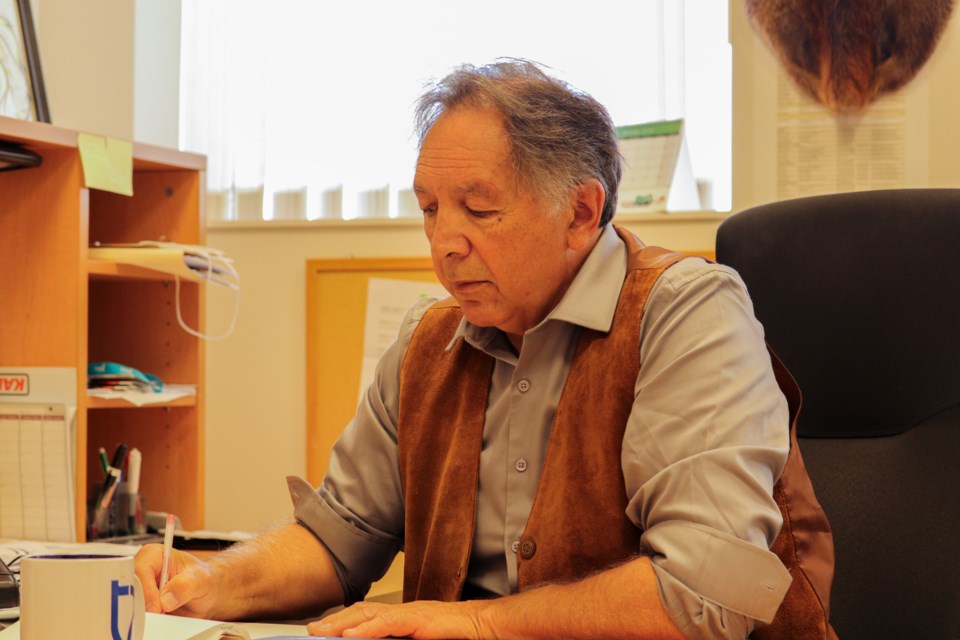Juno-award-winning musician and former grand chief Lawrence Martin says sometimes you have to work from within the systems in place to change things.
Martin was one of the speakers at the recent Omushkego Youth Treaty Conference in Timmins.
“Everyone has opinions about what the treaty is,” said Martin. “But when we look at what the legal definition of what a treaty is, from an international perspective, it says it’s a legally binding agreement between countries. Countries. So does that mean that we are part of a county? We must be.”
Challenging treaty interpretation has been a part of Martin’s career for decades, and the lessons he shared with the young people focused on the 22 words that were put into Treaty 9 that read: “Excepting such tracts that may be required or taken up from time to time for settlement, mining, lumbering, trading or other purposes.”
“That’s why Ontario or Canada can come to your territory and build dams,” explained Martin.
The James Bay Treaty — Treaty 9 — covers 90,000 square miles in Northern Ontario. It includes Timmins, which is situated on the traditional lands of Mattagami First Nation. For Indigenous people, it promised $4 each annually. The annual payment remains the same today.
Treaty 9 was first signed in 1905 and 1906 between Northern Ontario First Nations, the Canadian government and the provincial government. In 1929 and 1930, adhesions were made. It has the distinction of being the only treaty that is signed by the province.
RELATED: Meet Bentley Cheechoo, a Treaty 9 Knowledge Keeper
SEE: Moose Cree member shares history of Treaty 9
Martin was the first Indigenous mayor in Ontario in a community outside of First Nations lands when he was elected as mayor of Sioux Outlook in 1991. He became grand chief of the Mushkegowuk Council for the first time in 1998 and served until 2001. He was elected mayor of Cochrane and served there until 2010, and his second term as grand chief began in 2014.
Throughout his political career, he has worked within the political and legal system to advocate for his people.
He has been involved in legal actions to hold the federal government accountable to promises in treaties, including a 1999 filing where First Nations leaders submitted that the government did not uphold its responsibility to the well-being of the First Nations during the Rupert’s Land purchase.
“Court papers were filed, and we were given notice that they were received by Canada, and they would get back to us,” said Martin. “It’s been 20 years and we still haven’t received a response.”
The dispute over hunting rights in the Chapleau Crown Game Preserve showed the determination of Martin and his fellows when, in 2000, they purposefully had a ceremonial moose hunt with the intention of getting arrested and drawing attention to the issue of land rights in the area.
“We’re going to break your law because you broke the law we had,” said Martin about the confrontation.
Martin read a declaration about their sovereignty while four men in the group were arrested by game wardens.
When the Mike Harris government made drastic cuts to the Ontario Works program, the legal team for the Mushkegowuk council was able to use a section of the Indian Act to work around the cuts, because the council had not been consulted in a plan that directly affected their people.
They won the case and council was given two years to put together a social aid system of their own.
“We ran out of time,” said Martin.
He said that he later learned the Ministry of Indian Affairs allegedly worked against the project and against self-government.
While the work can be frustrating, Martin said it's worth the effort to bring the truth to light.
The discovery of the MacMartin diaries is an example.
When the Treaty 9 diary, written by Ontario’s Treaty Commissioner Daniel George MacMartin, was discovered at Queen’s University, it had recorded that Indigenous people were promised they could hunt and fish wherever they pleased.
“What those diaries said was exactly what our elders were telling us,” said Martin.
Martin says these battles are still going on today, and the youth have to be aware of it to keep their rights, exercise them, and know how to fight for them.
“We have to keep proving that the oral traditions of our people are just as good legally as anything (that's) written down.”
